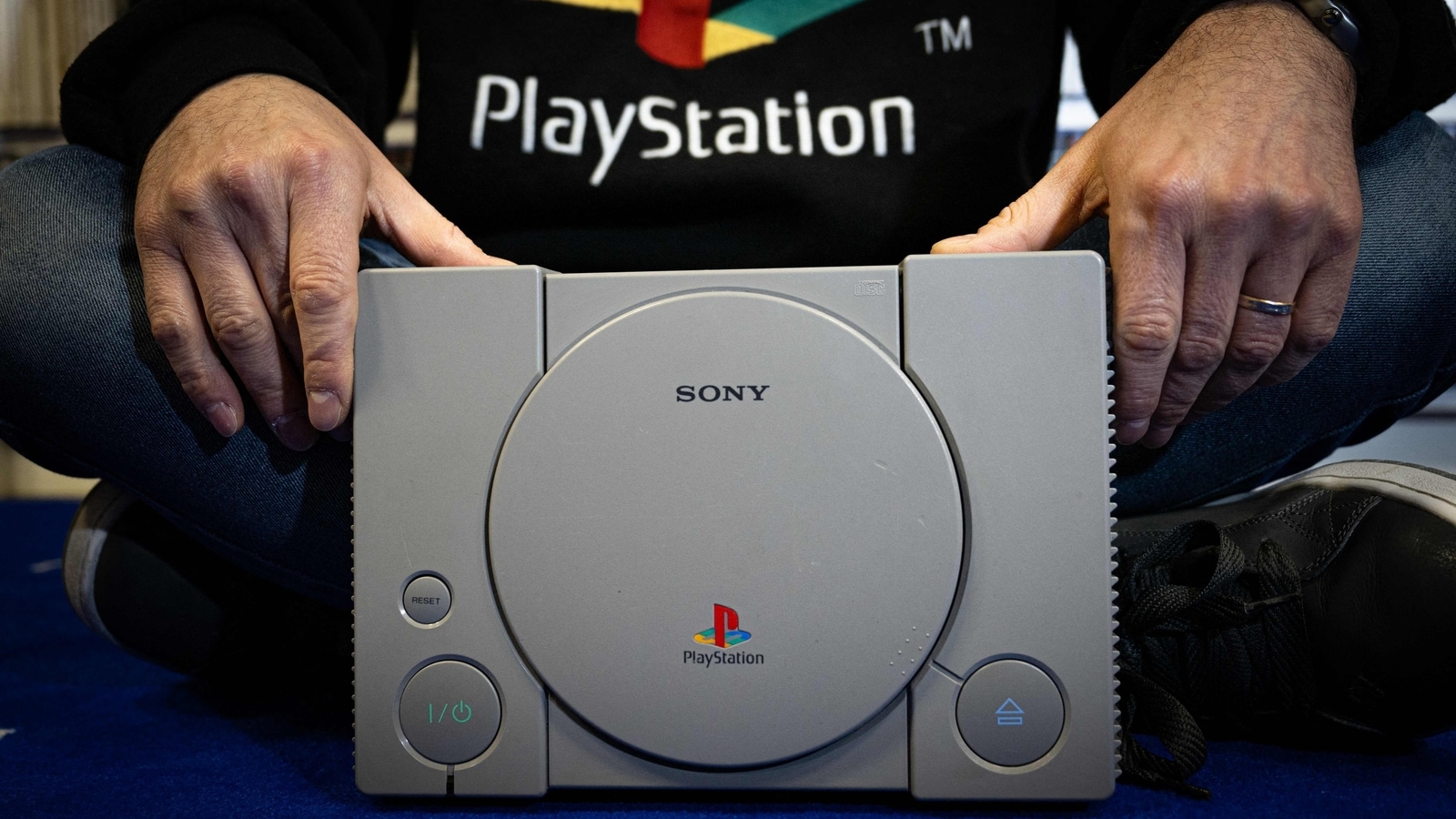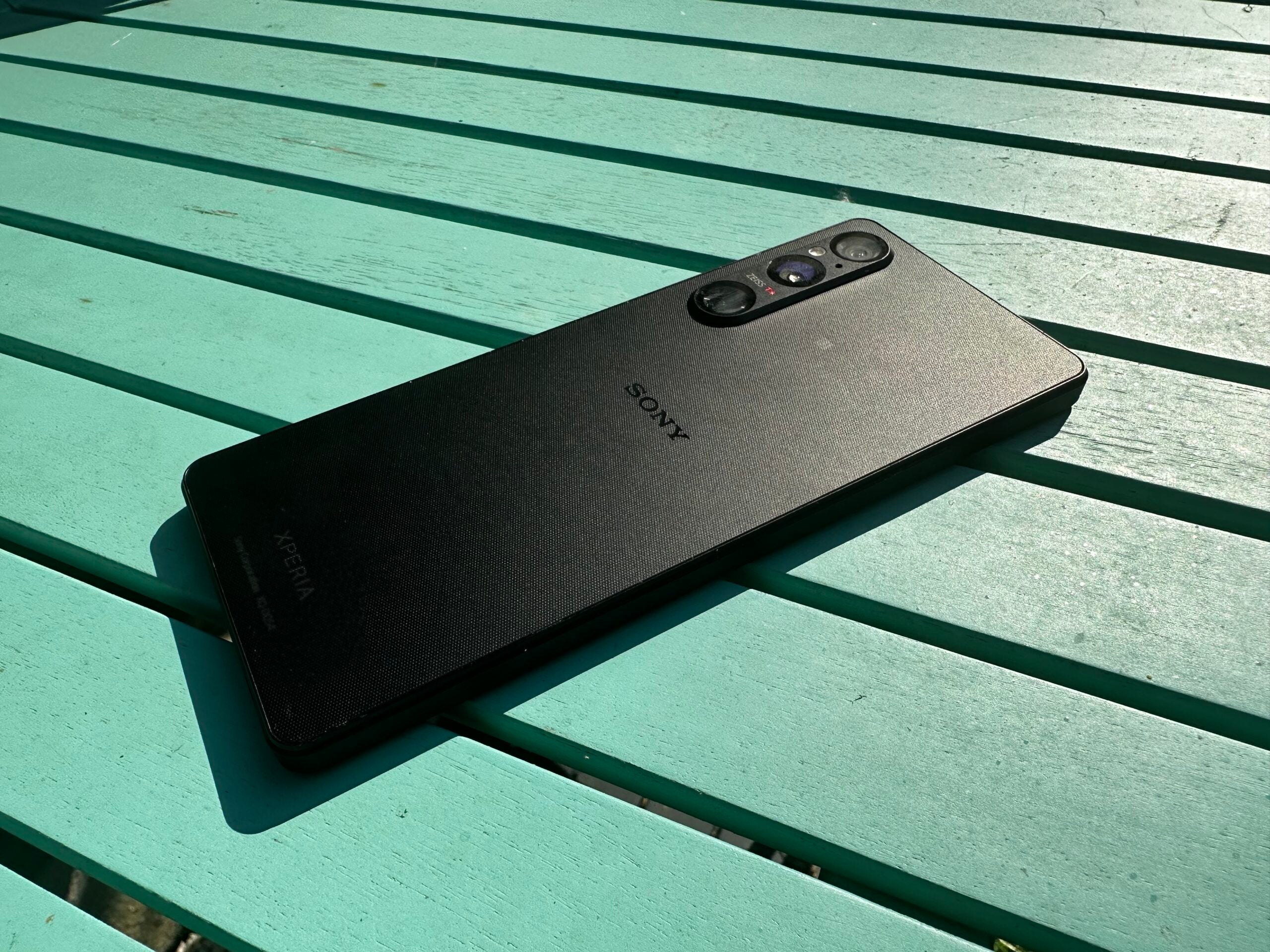Verdict
The Sony Xperia 1 V is a superb phone that barely puts a foot wrong. It’s lightning-fast with a great screen, enviable battery life and a superb camera array. You might quibble with the design, which remains an acquired taste, but it does everything exceptionally.
The price, however, remains so out of kilter with the market and Sony’s minnow-like status in it that you can’t imagine it giving the Apples, Samsungs and Xiaomis of this world much cause for concern.
Pros
- Speedy performance with top-notch internals
- Brilliant sound with a dedicated headphone jack
- Superb stamina with multi-day battery life
Cons
- It’s as expensive as non-folding phones get
- Bloatware is insulting in a phone this expensive
- Textured glass back feels a lot like plastic
-
Excellent camera array5.3x optical zoom lets you get closer to your subjects than most of its rivals. -
Stunning battery lifeStamina so strong that it almost interfered with the battery charging test. -
All the extrasFinally: a flagship offering expandable storage, dual-SIM use and a 3.5mm headphone jack!
Introduction
On paper, Sony should be at the very top of the smartphone tree. Just look at all the pies the company has fingers in: top-notch screens on Bravia TVs, a superb DSLR camera range, the audiophile’s choice of portable audio and the all-conquering PlayStation gaming brand.
This should all combine to make the perfect smartphone, and yet past results haven’t quite hit the spot. And it doesn’t help that Sony persists with Apple-like pricing, without the all-important audience of Apple-like enthusiasts to lap it up.
That mistake is repeated here: the Sony Xperia 1 V is a damned fine phone with several qualities that outshine the opposition, especially in the camera and sound department. But with a price tag of £1,299/$1,399 — £100/$300 more than Apple’s top-of-the-range iPhone 14 Pro Max — it’s a tough sell in anybody’s book, especially with a few backwards design choices holding it back.
Another curiosity with that eyebrow-raising price: for US residents, it represents a price cut on the Xperia 1 IV which arrived with an even more ‘optimistic’ MSRP of $1,599. Said price cut is not enjoyed on this side of the Atlantic, mind: it was £1,299 last generation, and remains so for a second year running.
Design and screen
- Boxy design with a grippy texture
- microSD card & 3.5mm headphone jack
- 6.5-inch 120Hz 4K display
In a world where, to most people, smartphones remain barely distinguishable black rectangles, you have to hand it to Sony for doing something different — or rather, persisting with it.
The Sony Xperia 1 V won’t be mistaken for an iPhone, or many Android devices for that matter. Its tall and thin 21:9 aspect ratio is a dead giveaway that you’re holding something unusual, and the company has made only slight attempts to smooth away its square, hard angles, with slightly curved corners. It’s not a design for everyone, but I personally think it looks very smart indeed.
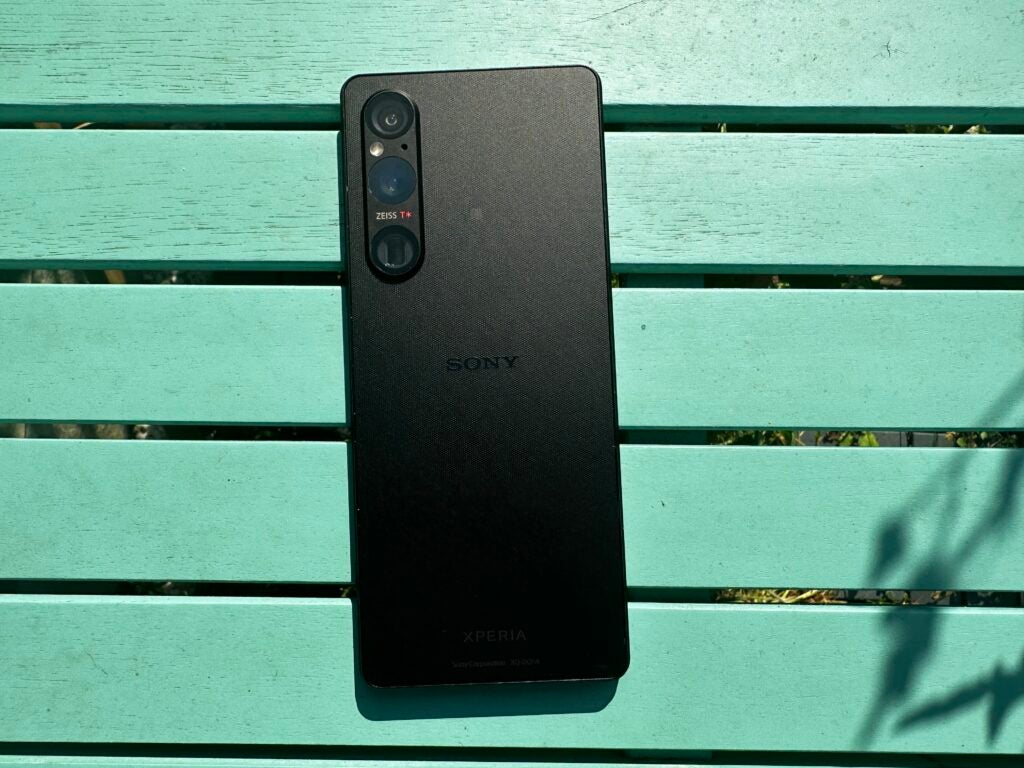
I’m not as sold on the grippy texture that Sony has put all the way around the phone. I don’t mind the ribbed lines on the side one bit, and they do make it harder to drop. But the texturing on the glass rear makes it feel unpleasantly like plastic, instantly losing the premium vibe.
It’s worth celebrating Sony’s continued dedication to consumer-friendly extras that other companies have sacrificed on the altar of cost-cutting and ever-increasing thinness. Expandable microSD card support? Check (up to 1TB). Dual SIM? Check. 3.5mm headphone jack? Checkeroo.
But Sony doesn’t get an entirely free pass here. Not only is there no charger in the box, there’s no cable either. There are extremely good logical and environmental reasons for doing this, but it still feels cheap on such an expensive product.
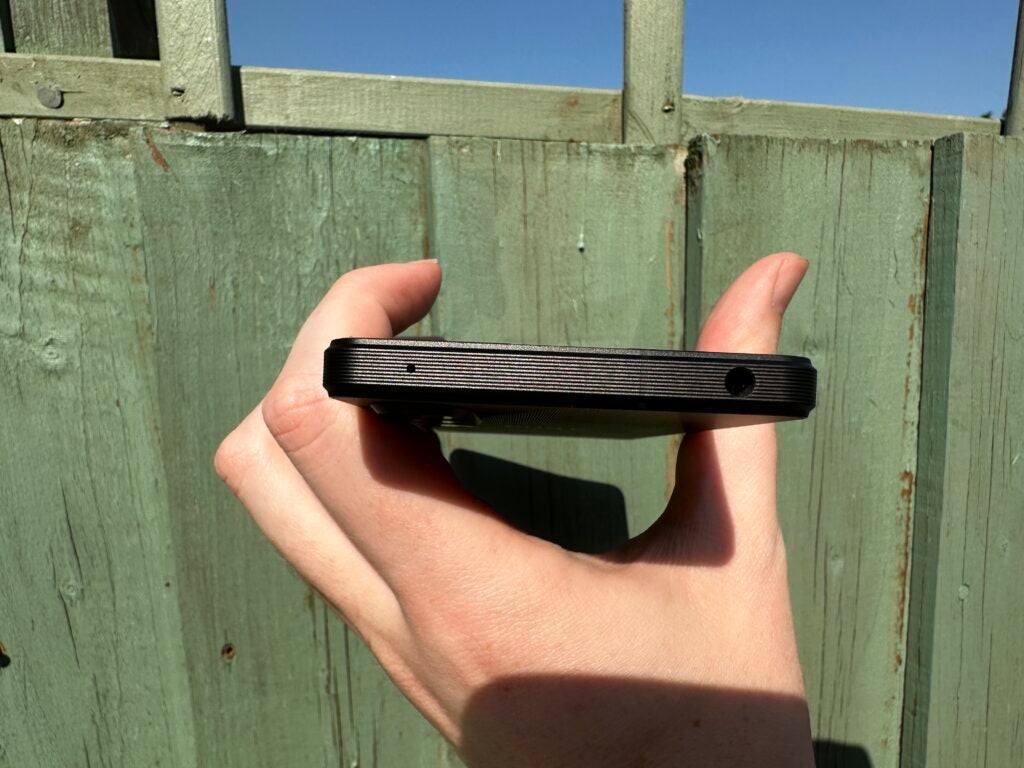
On the subject of expense, there’s one cut that — in my opinion — Sony could make very easily without losing much. Sony has stuck to its guns with 4K screens in its very top-end phones since 2015’s Sony Xperia Z5 Premium, without stopping to wonder why no other big players have followed suit.
I called that feature “magic beans” when I reviewed the phone elsewhere then, and I maintain that it’s still true now. The overwhelming majority of people simply can’t tell the difference between 2K and 4K on a screen this size — human eyes aren’t good enough — and it’s especially silly when Sony only enables 4K within certain first-party apps for battery reasons (and the likes of Netflix don’t bother supporting it in the app, given the scarcity of 4K mobile devices).
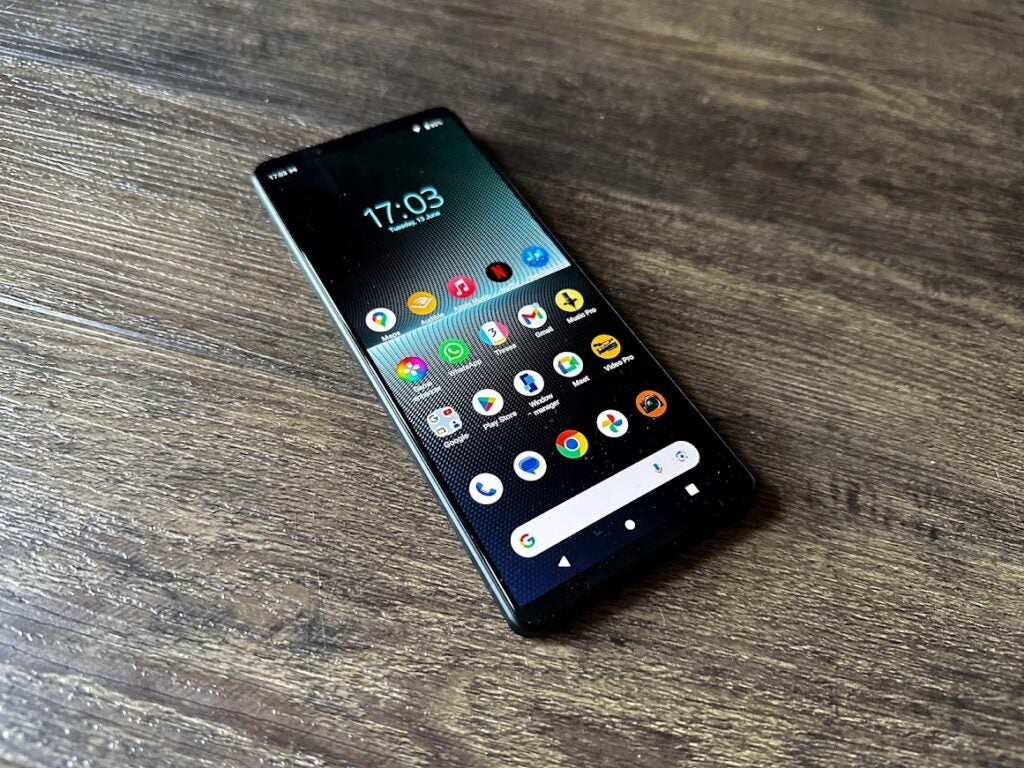
The sad thing is that even at its standard extended Full HD resolution (2,560 x 1,096) everything looks brilliant. It’s buttery smooth at 120Hz and it’s HDR10 certified making video content really pop.
That unusual aspect ratio is also good for video content. When Sony first announced it was switching to the unusual shape with the original Xperia 1, it did so by pointing out that 69% of Netflix content is shot in 21:9 meaning that cinephiles can enjoy more content without distracting black bars.
Cameras
- Main 52MP camera
- 12MP ultrawide and variable telephoto lenses
- Superb camera performance
Where Sony really pushes the boat out is on the Xperia 1 V’s cameras, all linked to a handy physical shutter button on the right-hand side of the phone.
On the back, two out of three are the same as the Xperia 1 IV’s with 12-megapixel ultrawide and telephoto lenses. This time, however, they’re accompanied by a 52-megapixel main sensor with improved processing chops.
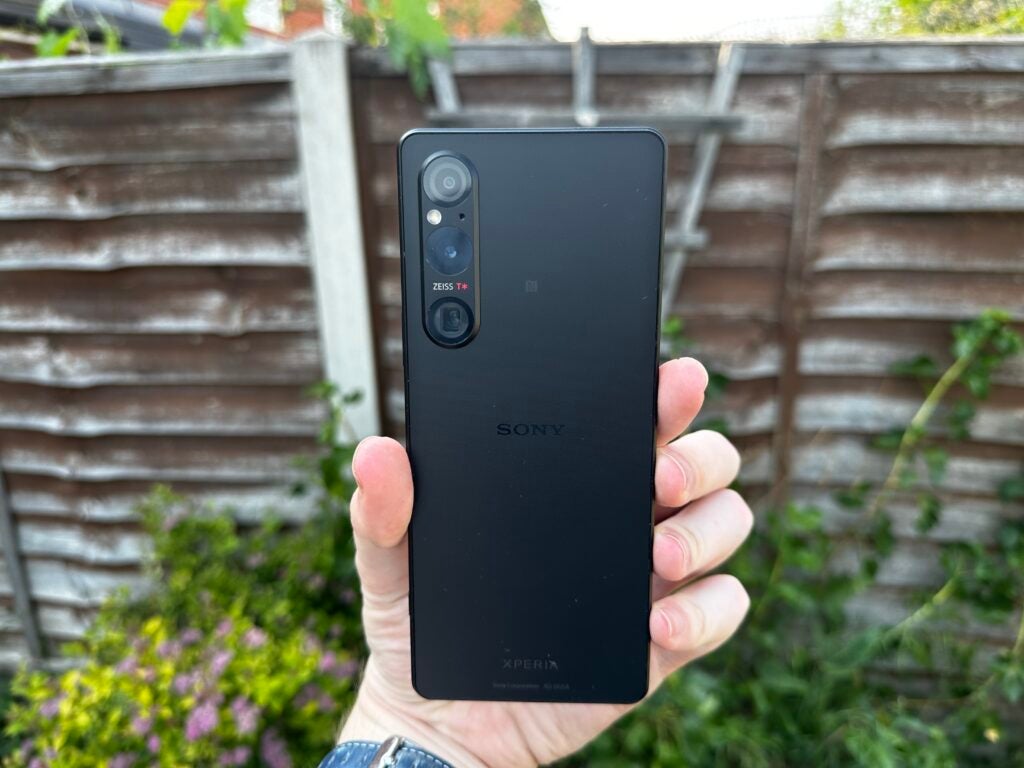
This all adds up to a superb camera setup, and one that can go toe-to-toe with its flagship rivals. Indeed, on long-range shots, Sony has the edge, with that variable telephoto lens capable of a 3.5x to 5.2x optical magnification.
That’s a considerable improvement on the 3x range of the iPhone 14 Pro, and a bit more flexible than the Samsung Galaxy S23 Ultra which has a 3x and 10x optical zoom, but uses digital for the space in between.
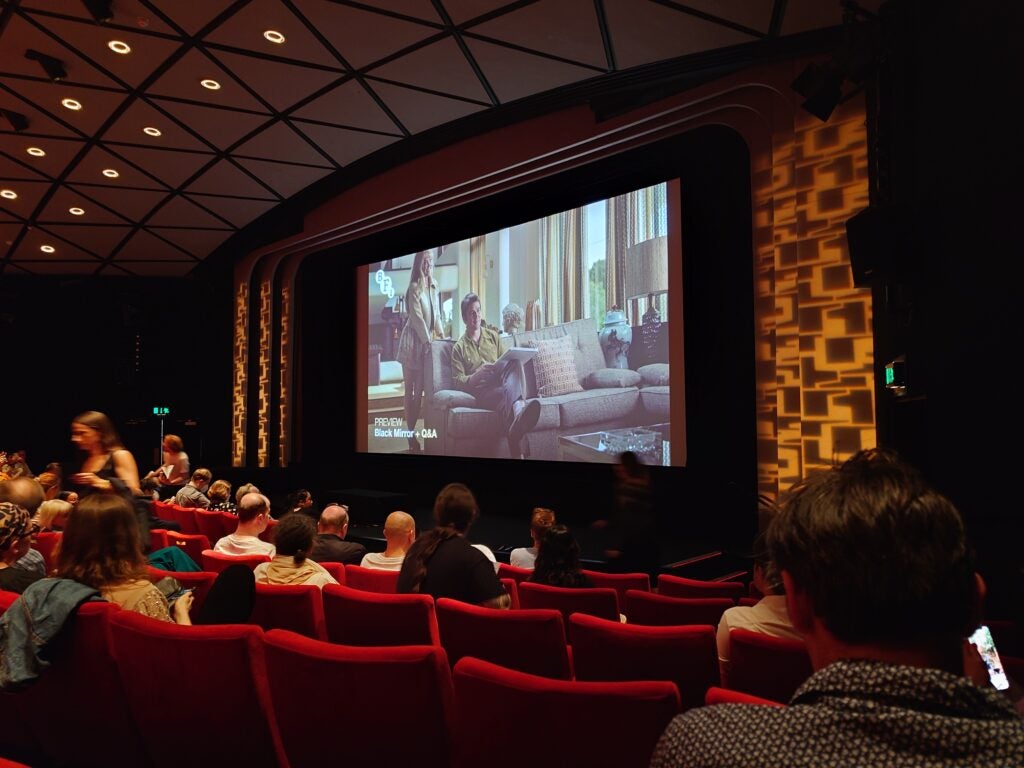
In good, daylight conditions, the Xperia 1 V takes truly excellent photos, and is a match for the iPhone 14 Pro as you can see in the comparison shots included.
Overall though, it’s a slight advantage to Apple, as demonstrated by the example below. Both phones struggle with the rushing water, but the iPhone 14 Pro has a better go at it — and the picture is less washed out too.


But if you want to get close while keeping your physical distance, Sony has the edge with its 5.2x zoom allowing me to get a better look at these nesting moorhens (I’m not a bird guy – I may be wrong on this!).


Of course, even budget phones can make a good fist of things in perfect conditions, and things often get a bit hairier in low light.
And unfortunately, at this point, the Xperia 1 V can’t match the iPhone 14 Pro’s image quality, with a touch more noise on the bulbs and leaves.
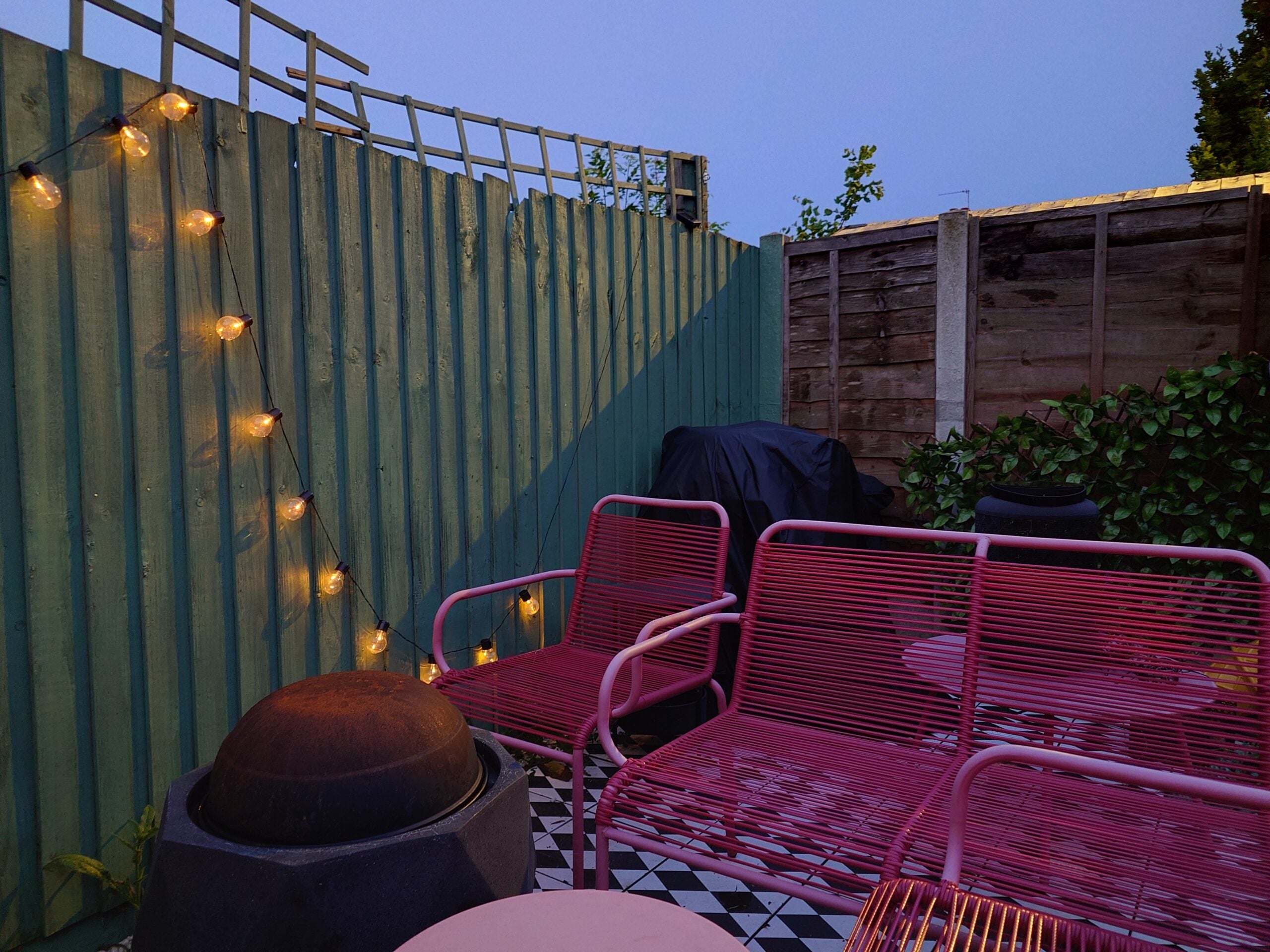
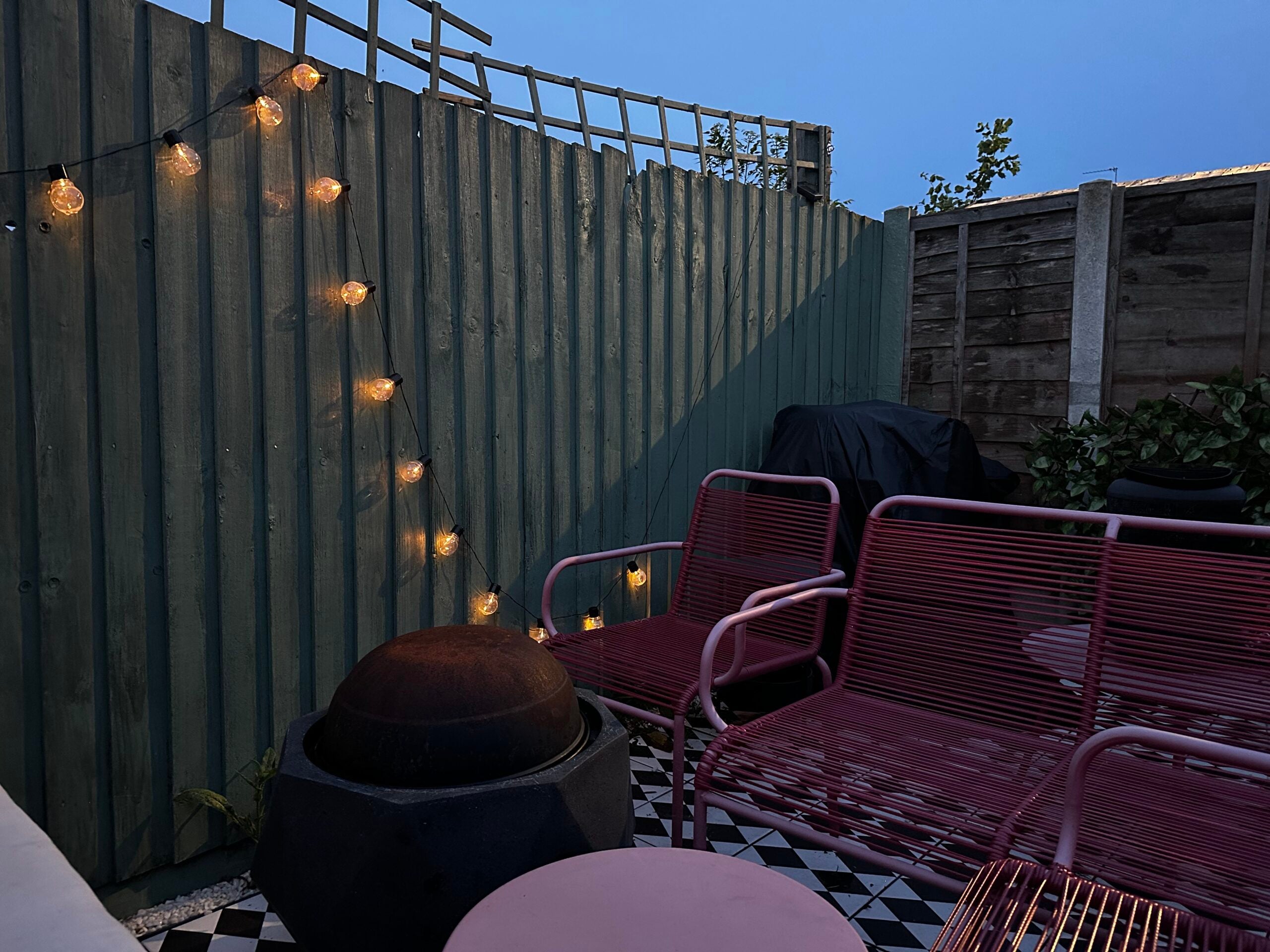
This was made all the more obvious when Brando, one of my cats, disrupted the shoot by jumping up on my lap. Thankfully, it turned out he was the perfect model, staying still while I got shots from both cameras which again confirms the iPhone 14 Pro’s supremacy for detail in low light.


But Sony does have one big advantage over its rivals in the camera department: the software itself. By default, you capture content via the Photo Pro, Video Pro and Cinema Pro apps, and these are an absolute dream for those that like to tinker with the settings, letting you adjust things like white balance, ISO and exposure compensation to your heart’s content.
Yes, there are third-party apps that do similar for the iPhone and other Android devices, but to have one that’s made hand-in-glove with the Xperia hardware makes it a cut above — even if it is a bit overwhelming to those who just like to point and shoot.
Video Pro is similarly fully featured, and it helps that the core hardware is very capable of capturing video. You can record 4K up to 120fps, and while it struggles a bit in low light, it still takes very good video indeed.
Performance
- Snapdragon 8 Gen 2
- 12GB of RAM and 256GB of expandable storage
- More pre-installed apps than expected
As well as this quality camera tech, nobody could accuse Sony of scrimping on the components that make Android tick. The Qualcomm Snapdragon 8 Gen 2 processor is backed by a generous 12GB RAM and 256GB of internal storage (which, again, can be topped up with a 1TB microSD card if you fancy).
This, as you might imagine, makes it fly in day-to-day use. Though you’ll have to use that imagination for some of the benchmarks for the time being, as our preview unit refused to run the GPU ones.
Geekbench 6 worked, though, and we got a single-core score of 1,982 and a multi-core one of 5,202. That’s actually a nose ahead of the Geekbench 6 scores for the Samsung Galaxy S23 Ultra, though in practice you wouldn’t notice a difference in regular use.
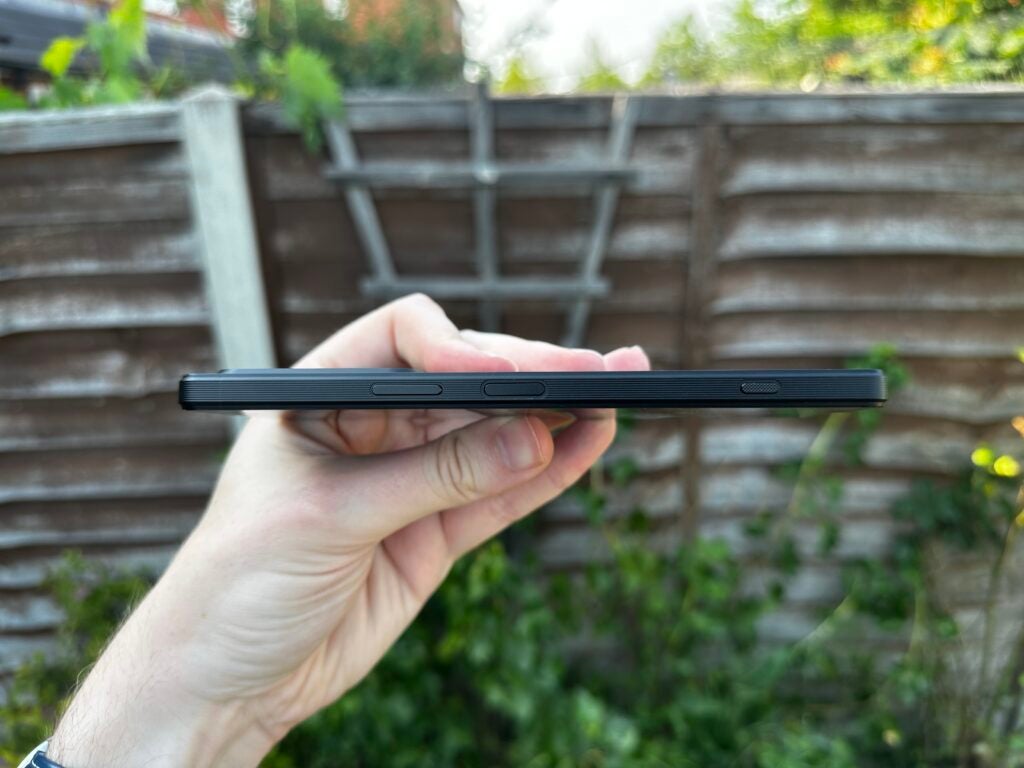
It’s worth taking some time out to look at audio here, which is an often-overlooked area where Sony really excels. Not only is there a dedicated 3.5mm headphone jack, meaning you’re not relying on laggy Bluetooth for your audio, but the Xperia 1 V has support for hi-resolution audio and High-Resolution Audio Wireless (LDAC) right out of the box.
It also has support for Dolby Sound and 360 Reality Audio, and there are plenty of settings to play with to make your music and movies sound just right (including one that makes the handset pulse to certain frequencies for slightly strange immersion in video).
The actual built-in speakers sound pretty marvellous too — obviously there’s only so much you can do on a device this small, but it’s a cut above the vast majority of smartphones out there.
Where it somewhat falls back is on the apps that come bundled with the phone. I didn’t download them, yet somehow I’ve got LinkedIn, Facebook, Booking.com, Amazon Shopping and a Tidal three-month trial all sitting uninvited on my home screen. These presumably sponsored inclusions feel a bit cheeky on a phone that costs well into four figures, even if they’re easy enough to delete. Say what you like about Apple: iOS doesn’t come with TripAdvisor or the Starbucks app forced upon you.
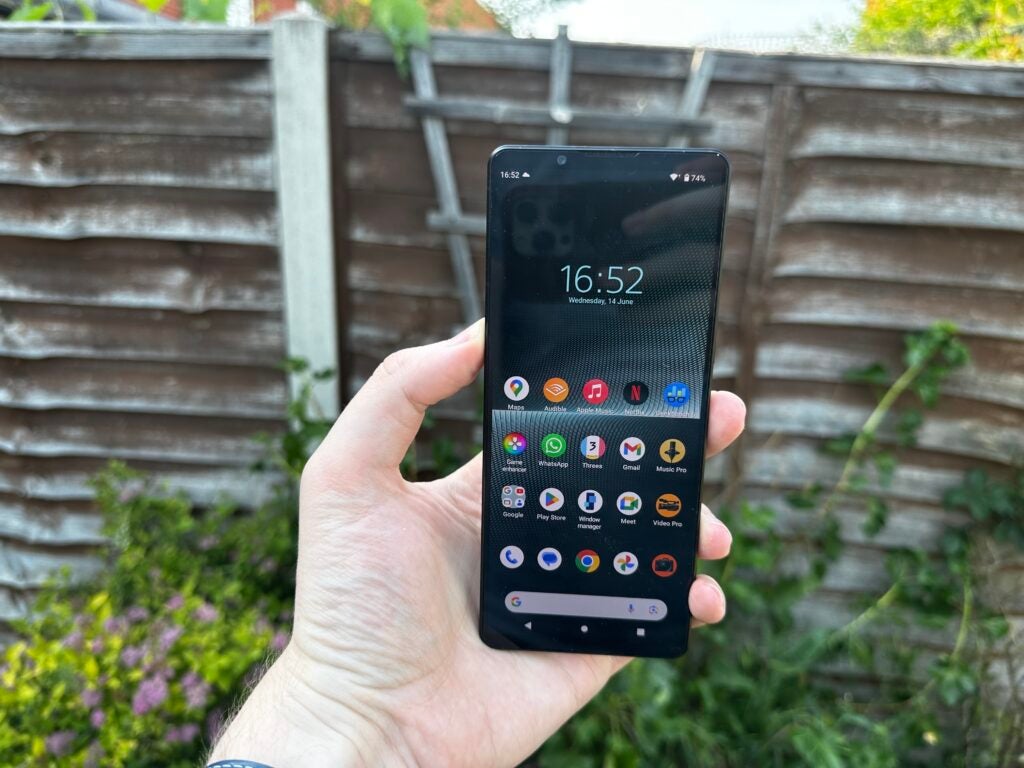
It’s a shame, because Sony’s own apps aren’t bad at all. Cinema Pro and Camera Pro really do make the most of that excellent camera array described previously, with plenty of tweaks that can only be accomplished with third-party apps on other devices. Ditto Music Pro which allows artists to record and edit tracks to “up-convert tracks you record on Xperia to Sony Music pro studio quality.”
But it would be easy to dismiss them as just more bloatware, given the presence of less welcome software on your brand-new handset.
Sony hasn’t given any guarantees as to how long the Xperia 1 V will be supported for, but if past flagships are anything to go by, you can expect two Android version updates plus an extra year of security patches. That’s some distance behind the likes of Samsung and Google, which both pledge five years of security updates.
Battery life
- 5000mAh battery
- Easily lasts all-day
- 30W fast charging
The Xperia 1V’s 5,000mAh battery is pretty phenomenal — at least, out of the box.
How ‘phenomenal’? Well, one of TrustedReview’s charging tests is to see how long a battery takes to fill from empty, and after two days of deliberately not charging it so that I could actually do my work, it was still sitting pretty on 57%.
I’d been using the handset as my main phone over this time, taking photos, sending messages, and browsing the web. I hadn’t played any games or watched any shows, but it’s still a testament to how long it can last if you’re a light user.
In the end, it took me another night of no charging, and over five hours of aggressively bright Netflix at full brightness with the flashlight on to drain it. Wow.
With adaptive brightness on, it lasts far longer. An hour of HDR content on Netflix saw a 5% drop, while 30 minutes of light gaming caused a 3% dip.
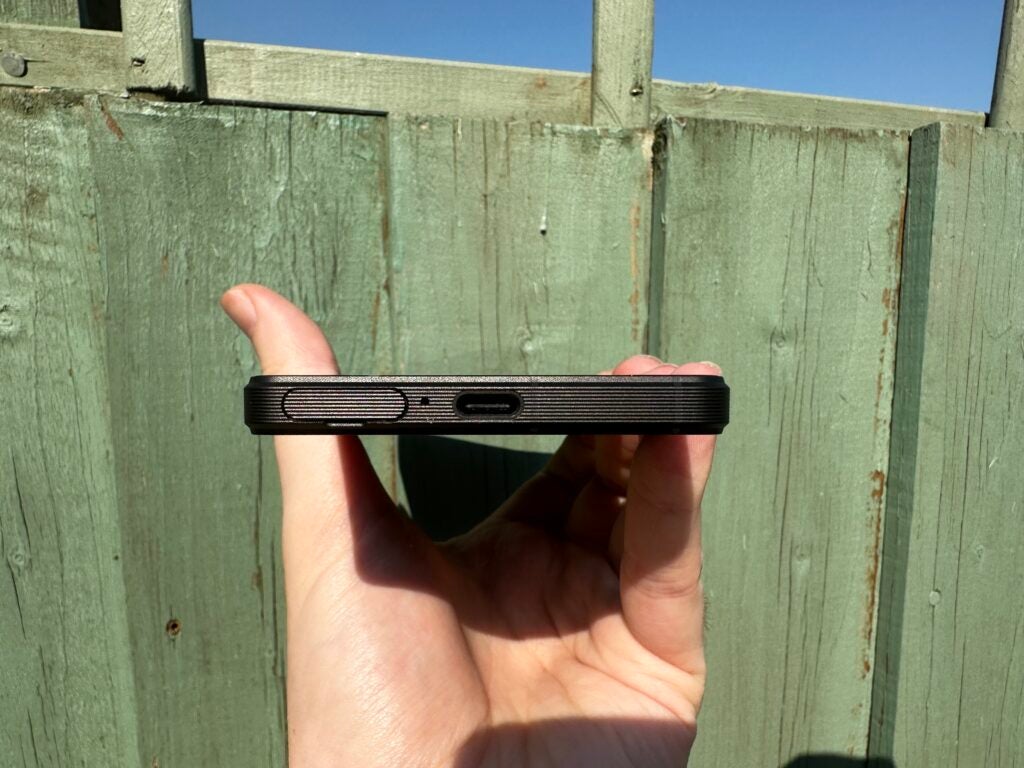
There’s no charger or cable in the box, as mentioned before, but plugging it into my Steam Deck’s 60W charger on empty saw it hit 50% in 38 minutes and 20 seconds, and reach 100% in one hour, 43 minutes and 50 seconds. A 15-minute burst gave it 21%.
I should add that through all of this, it did get very hot, but the UK was experiencing a heat wave that day, so your mileage may vary.
Latest deals
Should you buy it?
You want a phone without compromises:
From camera to sound, Sony hasn’t cut any corners at all. Even where it arguably should have (4K remains unnecessary on a screen this size).
Getting value for money is important to you:
All this comes at a price, and it’s simply too high for most people. When you’re outpricing Apple with a fraction of its market share, something has gone very wrong.
Final Thoughts
If money truly is no object, then you can buy the Sony Xperia 1 V with confidence. By objective metrics, it’s an excellent handset with zippy performance, a superb screen, an excellent camera array and jaw-dropping stamina. The design may not be to everyone’s tastes, and the bloatware feels cheap, but these are minor drawbacks.
No, the biggy is the price. At £1,299 it’s simply too expensive. It costs more than both the Samsung Galaxy S23 Ultra and the Apple iPhone 14 Pro Max — neither of which are exactly pocket change. To put it another way, it’s a whole £450 more than the excellent Google Pixel 7 Pro.
If you can stomach that, then the Sony Xperia 1 V is an outstanding smartphone that refuses to compromise. The sad truth, though? I kind of wish it would a bit, for the sake of consumer wallets and Sony’s future in the smartphone marketplace.
How we test
We test every mobile phone we review thoroughly. We use industry-standard tests to compare features properly and we use the phone as our main device over the review period. We’ll always tell you what we find and we never, ever, accept money to review a product.
Find out more about how we test in our ethics policy.
Used as a main phone for the review period
Thorough camera testing in a variety of conditions
Tested and benchmarked using respected industry tests and real-world data
FAQs
Surprisingly, given the price of the smartphone, it doesn’t come with a charging brick or even a USB-C cable in the box.
Trusted Reviews test data
Jargon buster
mAh
An abbreviation for milliampere-hour and a way to express the capacity of batteries, especially smaller ones in phones. In most cases the higher the mAh, the longer the battery will last but this isn’t always the case.
IP rating
An abbreviation for ‘Ingress Protection Code’, which lets you know to what extent a device might be waterproof or dustproof.
Verdict
The Sony Xperia 1 V is a superb phone that barely puts a foot wrong. It’s lightning-fast with a great screen, enviable battery life and a superb camera array. You might quibble with the design, which remains an acquired taste, but it does everything exceptionally.
The price, however, remains so out of kilter with the market and Sony’s minnow-like status in it that you can’t imagine it giving the Apples, Samsungs and Xiaomis of this world much cause for concern.
Pros
- Speedy performance with top-notch internals
- Brilliant sound with a dedicated headphone jack
- Superb stamina with multi-day battery life
Cons
- It’s as expensive as non-folding phones get
- Bloatware is insulting in a phone this expensive
- Textured glass back feels a lot like plastic
-
Excellent camera array5.3x optical zoom lets you get closer to your subjects than most of its rivals. -
Stunning battery lifeStamina so strong that it almost interfered with the battery charging test. -
All the extrasFinally: a flagship offering expandable storage, dual-SIM use and a 3.5mm headphone jack!
Introduction
On paper, Sony should be at the very top of the smartphone tree. Just look at all the pies the company has fingers in: top-notch screens on Bravia TVs, a superb DSLR camera range, the audiophile’s choice of portable audio and the all-conquering PlayStation gaming brand.
This should all combine to make the perfect smartphone, and yet past results haven’t quite hit the spot. And it doesn’t help that Sony persists with Apple-like pricing, without the all-important audience of Apple-like enthusiasts to lap it up.
That mistake is repeated here: the Sony Xperia 1 V is a damned fine phone with several qualities that outshine the opposition, especially in the camera and sound department. But with a price tag of £1,299/$1,399 — £100/$300 more than Apple’s top-of-the-range iPhone 14 Pro Max — it’s a tough sell in anybody’s book, especially with a few backwards design choices holding it back.
Another curiosity with that eyebrow-raising price: for US residents, it represents a price cut on the Xperia 1 IV which arrived with an even more ‘optimistic’ MSRP of $1,599. Said price cut is not enjoyed on this side of the Atlantic, mind: it was £1,299 last generation, and remains so for a second year running.
Design and screen
- Boxy design with a grippy texture
- microSD card & 3.5mm headphone jack
- 6.5-inch 120Hz 4K display
In a world where, to most people, smartphones remain barely distinguishable black rectangles, you have to hand it to Sony for doing something different — or rather, persisting with it.
The Sony Xperia 1 V won’t be mistaken for an iPhone, or many Android devices for that matter. Its tall and thin 21:9 aspect ratio is a dead giveaway that you’re holding something unusual, and the company has made only slight attempts to smooth away its square, hard angles, with slightly curved corners. It’s not a design for everyone, but I personally think it looks very smart indeed.

I’m not as sold on the grippy texture that Sony has put all the way around the phone. I don’t mind the ribbed lines on the side one bit, and they do make it harder to drop. But the texturing on the glass rear makes it feel unpleasantly like plastic, instantly losing the premium vibe.
It’s worth celebrating Sony’s continued dedication to consumer-friendly extras that other companies have sacrificed on the altar of cost-cutting and ever-increasing thinness. Expandable microSD card support? Check (up to 1TB). Dual SIM? Check. 3.5mm headphone jack? Checkeroo.
But Sony doesn’t get an entirely free pass here. Not only is there no charger in the box, there’s no cable either. There are extremely good logical and environmental reasons for doing this, but it still feels cheap on such an expensive product.

On the subject of expense, there’s one cut that — in my opinion — Sony could make very easily without losing much. Sony has stuck to its guns with 4K screens in its very top-end phones since 2015’s Sony Xperia Z5 Premium, without stopping to wonder why no other big players have followed suit.
I called that feature “magic beans” when I reviewed the phone elsewhere then, and I maintain that it’s still true now. The overwhelming majority of people simply can’t tell the difference between 2K and 4K on a screen this size — human eyes aren’t good enough — and it’s especially silly when Sony only enables 4K within certain first-party apps for battery reasons (and the likes of Netflix don’t bother supporting it in the app, given the scarcity of 4K mobile devices).

The sad thing is that even at its standard extended Full HD resolution (2,560 x 1,096) everything looks brilliant. It’s buttery smooth at 120Hz and it’s HDR10 certified making video content really pop.
That unusual aspect ratio is also good for video content. When Sony first announced it was switching to the unusual shape with the original Xperia 1, it did so by pointing out that 69% of Netflix content is shot in 21:9 meaning that cinephiles can enjoy more content without distracting black bars.
Cameras
- Main 52MP camera
- 12MP ultrawide and variable telephoto lenses
- Superb camera performance
Where Sony really pushes the boat out is on the Xperia 1 V’s cameras, all linked to a handy physical shutter button on the right-hand side of the phone.
On the back, two out of three are the same as the Xperia 1 IV’s with 12-megapixel ultrawide and telephoto lenses. This time, however, they’re accompanied by a 52-megapixel main sensor with improved processing chops.

This all adds up to a superb camera setup, and one that can go toe-to-toe with its flagship rivals. Indeed, on long-range shots, Sony has the edge, with that variable telephoto lens capable of a 3.5x to 5.2x optical magnification.
That’s a considerable improvement on the 3x range of the iPhone 14 Pro, and a bit more flexible than the Samsung Galaxy S23 Ultra which has a 3x and 10x optical zoom, but uses digital for the space in between.

In good, daylight conditions, the Xperia 1 V takes truly excellent photos, and is a match for the iPhone 14 Pro as you can see in the comparison shots included.
Overall though, it’s a slight advantage to Apple, as demonstrated by the example below. Both phones struggle with the rushing water, but the iPhone 14 Pro has a better go at it — and the picture is less washed out too.


But if you want to get close while keeping your physical distance, Sony has the edge with its 5.2x zoom allowing me to get a better look at these nesting moorhens (I’m not a bird guy – I may be wrong on this!).


Of course, even budget phones can make a good fist of things in perfect conditions, and things often get a bit hairier in low light.
And unfortunately, at this point, the Xperia 1 V can’t match the iPhone 14 Pro’s image quality, with a touch more noise on the bulbs and leaves.


This was made all the more obvious when Brando, one of my cats, disrupted the shoot by jumping up on my lap. Thankfully, it turned out he was the perfect model, staying still while I got shots from both cameras which again confirms the iPhone 14 Pro’s supremacy for detail in low light.


But Sony does have one big advantage over its rivals in the camera department: the software itself. By default, you capture content via the Photo Pro, Video Pro and Cinema Pro apps, and these are an absolute dream for those that like to tinker with the settings, letting you adjust things like white balance, ISO and exposure compensation to your heart’s content.
Yes, there are third-party apps that do similar for the iPhone and other Android devices, but to have one that’s made hand-in-glove with the Xperia hardware makes it a cut above — even if it is a bit overwhelming to those who just like to point and shoot.
Video Pro is similarly fully featured, and it helps that the core hardware is very capable of capturing video. You can record 4K up to 120fps, and while it struggles a bit in low light, it still takes very good video indeed.
Performance
- Snapdragon 8 Gen 2
- 12GB of RAM and 256GB of expandable storage
- More pre-installed apps than expected
As well as this quality camera tech, nobody could accuse Sony of scrimping on the components that make Android tick. The Qualcomm Snapdragon 8 Gen 2 processor is backed by a generous 12GB RAM and 256GB of internal storage (which, again, can be topped up with a 1TB microSD card if you fancy).
This, as you might imagine, makes it fly in day-to-day use. Though you’ll have to use that imagination for some of the benchmarks for the time being, as our preview unit refused to run the GPU ones.
Geekbench 6 worked, though, and we got a single-core score of 1,982 and a multi-core one of 5,202. That’s actually a nose ahead of the Geekbench 6 scores for the Samsung Galaxy S23 Ultra, though in practice you wouldn’t notice a difference in regular use.

It’s worth taking some time out to look at audio here, which is an often-overlooked area where Sony really excels. Not only is there a dedicated 3.5mm headphone jack, meaning you’re not relying on laggy Bluetooth for your audio, but the Xperia 1 V has support for hi-resolution audio and High-Resolution Audio Wireless (LDAC) right out of the box.
It also has support for Dolby Sound and 360 Reality Audio, and there are plenty of settings to play with to make your music and movies sound just right (including one that makes the handset pulse to certain frequencies for slightly strange immersion in video).
The actual built-in speakers sound pretty marvellous too — obviously there’s only so much you can do on a device this small, but it’s a cut above the vast majority of smartphones out there.
Where it somewhat falls back is on the apps that come bundled with the phone. I didn’t download them, yet somehow I’ve got LinkedIn, Facebook, Booking.com, Amazon Shopping and a Tidal three-month trial all sitting uninvited on my home screen. These presumably sponsored inclusions feel a bit cheeky on a phone that costs well into four figures, even if they’re easy enough to delete. Say what you like about Apple: iOS doesn’t come with TripAdvisor or the Starbucks app forced upon you.

It’s a shame, because Sony’s own apps aren’t bad at all. Cinema Pro and Camera Pro really do make the most of that excellent camera array described previously, with plenty of tweaks that can only be accomplished with third-party apps on other devices. Ditto Music Pro which allows artists to record and edit tracks to “up-convert tracks you record on Xperia to Sony Music pro studio quality.”
But it would be easy to dismiss them as just more bloatware, given the presence of less welcome software on your brand-new handset.
Sony hasn’t given any guarantees as to how long the Xperia 1 V will be supported for, but if past flagships are anything to go by, you can expect two Android version updates plus an extra year of security patches. That’s some distance behind the likes of Samsung and Google, which both pledge five years of security updates.
Battery life
- 5000mAh battery
- Easily lasts all-day
- 30W fast charging
The Xperia 1V’s 5,000mAh battery is pretty phenomenal — at least, out of the box.
How ‘phenomenal’? Well, one of TrustedReview’s charging tests is to see how long a battery takes to fill from empty, and after two days of deliberately not charging it so that I could actually do my work, it was still sitting pretty on 57%.
I’d been using the handset as my main phone over this time, taking photos, sending messages, and browsing the web. I hadn’t played any games or watched any shows, but it’s still a testament to how long it can last if you’re a light user.
In the end, it took me another night of no charging, and over five hours of aggressively bright Netflix at full brightness with the flashlight on to drain it. Wow.
With adaptive brightness on, it lasts far longer. An hour of HDR content on Netflix saw a 5% drop, while 30 minutes of light gaming caused a 3% dip.

There’s no charger or cable in the box, as mentioned before, but plugging it into my Steam Deck’s 60W charger on empty saw it hit 50% in 38 minutes and 20 seconds, and reach 100% in one hour, 43 minutes and 50 seconds. A 15-minute burst gave it 21%.
I should add that through all of this, it did get very hot, but the UK was experiencing a heat wave that day, so your mileage may vary.
Latest deals
Should you buy it?
You want a phone without compromises:
From camera to sound, Sony hasn’t cut any corners at all. Even where it arguably should have (4K remains unnecessary on a screen this size).
Getting value for money is important to you:
All this comes at a price, and it’s simply too high for most people. When you’re outpricing Apple with a fraction of its market share, something has gone very wrong.
Final Thoughts
If money truly is no object, then you can buy the Sony Xperia 1 V with confidence. By objective metrics, it’s an excellent handset with zippy performance, a superb screen, an excellent camera array and jaw-dropping stamina. The design may not be to everyone’s tastes, and the bloatware feels cheap, but these are minor drawbacks.
No, the biggy is the price. At £1,299 it’s simply too expensive. It costs more than both the Samsung Galaxy S23 Ultra and the Apple iPhone 14 Pro Max — neither of which are exactly pocket change. To put it another way, it’s a whole £450 more than the excellent Google Pixel 7 Pro.
If you can stomach that, then the Sony Xperia 1 V is an outstanding smartphone that refuses to compromise. The sad truth, though? I kind of wish it would a bit, for the sake of consumer wallets and Sony’s future in the smartphone marketplace.
How we test
We test every mobile phone we review thoroughly. We use industry-standard tests to compare features properly and we use the phone as our main device over the review period. We’ll always tell you what we find and we never, ever, accept money to review a product.
Find out more about how we test in our ethics policy.
Used as a main phone for the review period
Thorough camera testing in a variety of conditions
Tested and benchmarked using respected industry tests and real-world data
FAQs
Surprisingly, given the price of the smartphone, it doesn’t come with a charging brick or even a USB-C cable in the box.
Trusted Reviews test data
Jargon buster
mAh
An abbreviation for milliampere-hour and a way to express the capacity of batteries, especially smaller ones in phones. In most cases the higher the mAh, the longer the battery will last but this isn’t always the case.
IP rating
An abbreviation for ‘Ingress Protection Code’, which lets you know to what extent a device might be waterproof or dustproof.

